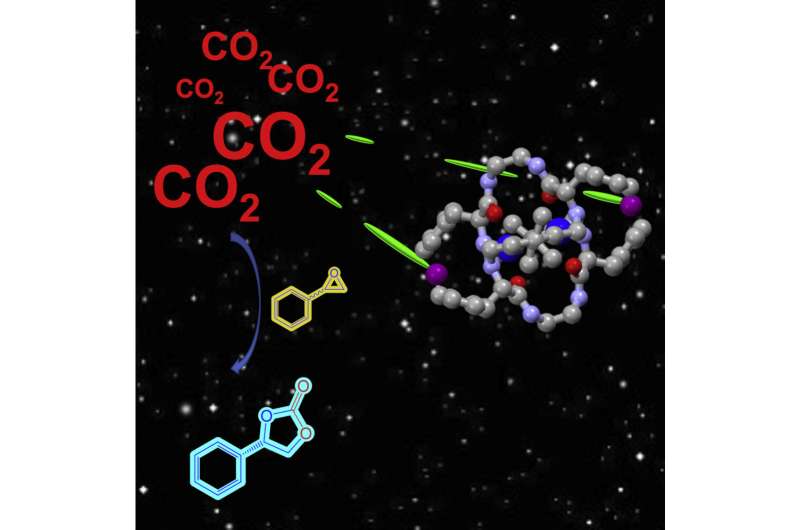This article has been reviewed according to Science X's editorial process and policies. Editors have highlighted the following attributes while ensuring the content's credibility:
fact-checked
trusted source
proofread
A new catalyst that transforms carbon dioxide into added-value chemical products

Global warming is an increasingly worrying problem. Although the greenhouse effect is a necessary process to maintain living conditions on Earth, our current societies are increasing the emission of greenhouse gases into the atmosphere and increasing its temperature by retaining more heat than necessary. Nature is trying to counteract this situation: plants are able to capture energy from sunlight and convert CO2 into chemical energy and organic matter.
Inspired by this natural process, the Supramolecular and Sustainable Chemistry Group of the Department of Inorganic and Organic Chemistry at the Universitat Jaume I in Castelló has developed a catalyst that can transform CO2 into high added-value chemical products, especially cyclic carbonates. The technology, validated at an experimental level in the laboratory environment, seeks development and adaptation in specific applications through specific agreements and licenses with companies.
This invention, framed in the field of synthetic chemistry and also environmental chemistry, would be applicable in industries that generate waste flows with a high carbon dioxide (CO2) content and in industries in the fine chemicals or pharmaceutical sector that use chiral cyclic carbonates as intermediates. The new pseudopeptide catalytic system allows the production of cyclic carbonates from dilute CO2 under mild pressure and temperature conditions and in an enantioselective way.
Thus, this catalyst can contribute to the development of circular and sustainable economy, in which a waste or residue from one industry becomes the raw material for another. This technology enables the production of high added value products such as cyclic carbonates, which are important industrial chemicals with diverse applications: environmentally friendly solvents, lithium-ion batteries, paints and coatings, resins, precursors for polymeric materials and polymer processing in fine chemistry.
Some of their technical advantages are the fact that these chiral bimetallic catalysts do not require the presence of a co-catalyst; they are able to act under mild pressure and temperature conditions and can be biodegradable due to their pseudopeptide structure. These characteristics allow cost savings, reduce the waste generated in catalysis, reuse residual energy (circular economy) and obtain chiral products with high added value.
The work is published in the journal Chem Catalysis.
More information: Ferran Esteve et al, A bioinspired approach toward efficient supramolecular catalysts for CO2 conversion, Chem Catalysis (2022). DOI: 10.1016/j.checat.2022.11.021
Provided by Asociacion RUVID




















